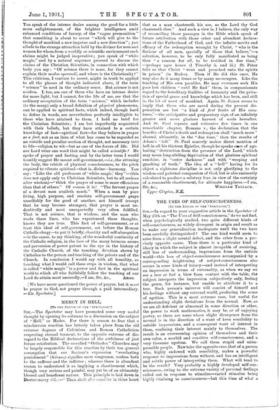MERCY IN HELL.
(To THE EDITOR OP THE "SPECTATOR."] Sin,—The Spectator may have promoted some very useful thought by opening its columns to a. discussion on the subject of"Hell," or Hades. For there is reason to fear that a mischievous reaction has latterly taken place from the old extreme dogmas of Calvinism and Roman Catholicism respecting eternal torment, to the opposite extreme of dis- regard to the Biblical declarations of the awfulness of just future retribution. The so-called " Orthodox " Churches may be largely responsible for this reaction by their too _general assumption that our Saviour's expression "everlasting "punishment" (KArza JO signifies mere vengeance, useless both to the sufferer and the inflicter ; whereas there is abundant reason to understand it as implying a Chastisement which, though very serious and painful, may yet be of an ultimately blessed and beneficent nature. This principle is laid down in Deuteronomy viii. :—" Thou shalt ab:o consEer in thine heart
that as a man chasteneth his son, so the Lord thy God chasteneth thee." And such a view is, I believe, the only.way of reconciling those passages in the Bible which speak of future retribution with those other and abundant declara- tions of the Fatherhood of God, and the infinite merits and efficacy of the redemption wrought by Christ., "who is the Saviour of al/ men, specially of those that believe,"—a salvation, however, to be only fully manifested as .being thus "a ransom for all, to be testified in due time," —perhaps ages hence (1 Timothy ii. and iii.) St. Peter tells us that Christ "went and preached unto the spirits in prison" (in Hades). Then if He did this once, He may also do it many times or by many messengers. Like the teaching of His own parables, He may evermore seek His poor lost children "until He find" them, in compassionate regard to the hereditary frailties of humanity and the priva- tion of special grace and knowledge which has been, and still is, the lot of most of mankind. Again, St. James seems to imply that those who are saved during the present dis- pensation are but a kind of first fruits of His crea- tures,"—the anticipative and preparatory sign of an infinitely greater and more glorious harvest of souls hereafter. And St. Paul repeats and reiterates five times in 'one remarkable chapter, Romans v., the declaration that the benefits of Christ's•death and redemption shall "much more" abound, ultimately, in the "due time," than the results of
Adam's " St. Paul scarcely makes direct mention of hell in all his thirteen Epistles, though he speaks owe of age- lasting "destruction from the presence of the Lord," which may mean long-abiding deprivation of that glorious spiritual sunshine, in "outer darkness" and with "weeping and gnashing of teeth." The idea- of a "hell" having for its object a righteous discipline is not only glorifying to the wisdom and paternal compassion of God, but is also eminently calculated to produce a salutary fear, in view of the certainty of 'a reasonable chastisement, for ultimate happiness.—I-ám,






































 Previous page
Previous page